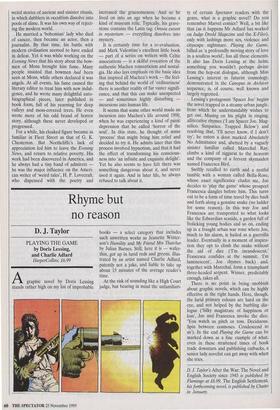Rhyme but no reason
D. J. Taylor
PLAYING THE GAME by Doris Lessing, and Charlie Adlard HarperCollins, £6,99 Agraphic novel by Doris Lessing stands rather high on my list of improbable books — a select category that includes such unwritten works as Jeanette Winter- son's Humility and My Friend Mrs Thatcher by Julian Barnes. Still, here it is — wafer- thin, got up in lurid reds and greens, illus- trated by an artist named Charlie Adlard, patently not a joke, and liable to take up about 15 minutes of the average reader's time.
At the risk of sounding like a High Court judge, but bearing in mind the unfamiliari- ty of certain Spectator readers with the genre, what is a graphic novel? Do you remember Marvel comics? Well, a bit like that (as it happens Mr Adlard has worked on Judge Dredd Magazine and the X-Files), only with lashings more sex, violence and cityscape nightmare. Playing the Game, billed as 'a profoundly moving story of love in a soulless world', has all these elements. It also has Doris Lessing at the helm, something you wouldn't perhaps divine from the hep-cat dialogue, although Miss Lessing's interest in futurist cosmology, demonstrated in the Canopus in Archives sequence, is, of course, well known and largely regretted.
Lessing's protagonist 'Spacer Joe' begins the novel trapped in a steamy urban jungle, from which he understandably wishes to get out. Musing on his plight in ringing, alliterative rhymes CI am Spacer Joe. Mag- nifico. Simpatico. Trapped Below') and resolving that, 'I'll never know, if I don't try', he enters a door marked Absolutely No Admittance and, abetted by a vaguely sinister familiar called Marechal Ray, climbs a kind of ziggurat to the heavens and the company of a fervent skymaiden named Francesca Bird.
Swiftly recalled to earth and a zestful tumble with a woman called Bella-Rose, whose exact significance eludes me, Joe decides to 'play the game' whose prospect Francesca dangles before him. This turns out to be a form of time travel by dice back and forth along a genuine snake (no ladder for some reason). In this way Joe and Francesca are transported to what looks like the Edwardian seaside, a garden full of frolicking young bodies and so on, ending up in a fraught urban war zone where Joe, much to his alarm, is hailed as a guerrilla leader. Eventually in a moment of inspira- tion they opt to climb the snake without the aid of dice (I'm incandescent,' Francesca confides at the summit; 'I'm luminescent', Joe rhymes back) and, together with Marechal, form a triumphant three-headed serpent. Winner, predictably enough, takes all.
There is no point in being snobbish about graphic novels, which can be highly effective in the right hands. Here, though, the lurid primary colours are hard on the eye, and not helped by the burbling dia- logue (`Silky magistrate of happiness or loss', Joe and Francesca invoke the dice. `You watch us pitch or toss. Deciduous. Spin between cosmoses. Condescend to us'). In the end Playing the Game can be marked down as a fine example of what, even in these straitened times of book trade downturn and publishing cutbacks, a senior lady novelist can get away with when she tries.
D. J. Taylor's After the War: The Novel and English Society since 1945 is published by Flamingo at £6.99. The English Settlement, his forthcoming novel, is published by Chatto in January.


















































































 Previous page
Previous page